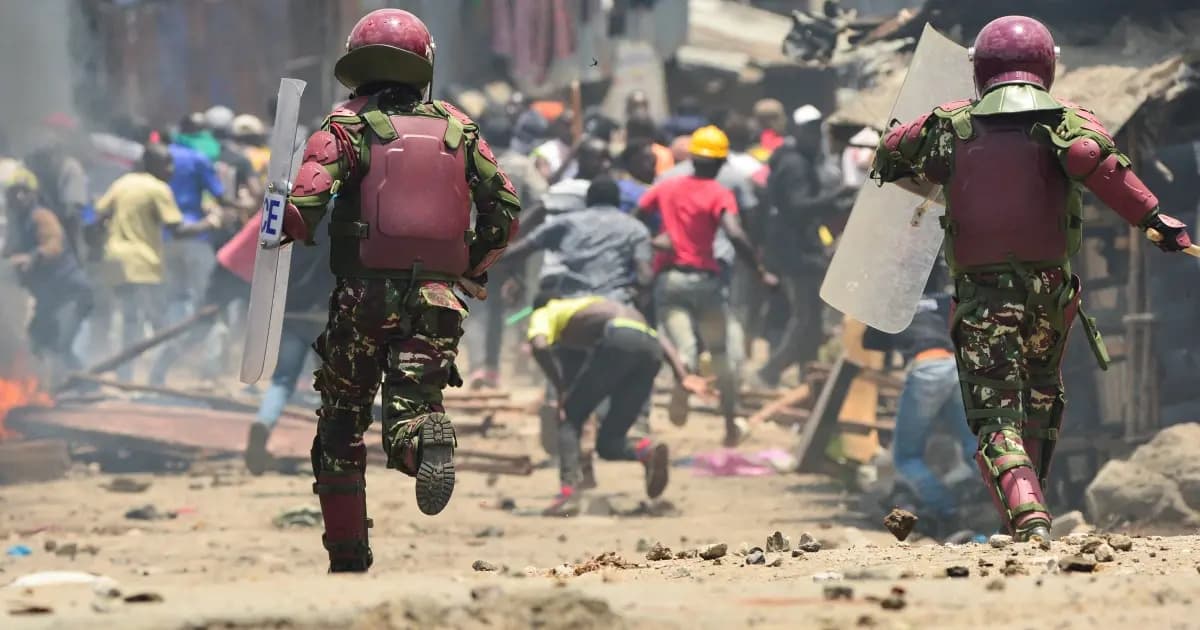We're loading the full news article for you. This includes the article content, images, author information, and related articles.
An investigation into the recruitment, payment, and deployment of youth gangs by political actors reveals a deep-seated system of violence-for-hire that threatens Kenya's democratic stability and rule of law.

For as little as KSh 500, a young person in Kenya can be contracted to disrupt a peaceful protest, intimidate voters, or attack a political rival. This is the grim reality of Kenya's political landscape, where a shadow economy of violence thrives on the desperation of unemployed youth. A recent report by the research firm Odipodev and the youth network Tribeless Youth, titled “Goonland: Looking Beyond the Money and Violence,” details a structured, albeit murky, enterprise where political and business interests purchase violence on demand. Payments, often made in cash at discreet locations like petrol stations to avoid a paper trail, vary by risk. A junior goon might earn KSh 500 for a day of disruption, while higher-ranking members who handle recruitment and operations can make between KSh 800 and KSh 1,500. More dangerous tasks, such as guarding illegal businesses or physically confronting rivals, can fetch between KSh 2,000 and KSh 5,000 per job.
The recruitment network is extensive and deeply embedded in communities, particularly in low-income urban areas where unemployment is rampant. According to the Federation of Kenyan Employers (FKE), the unemployment rate for Kenyans aged 15-34 is a staggering 67%. Political mobilizers, estate chairpersons, and local influencers act as brokers, identifying and assembling teams of youths. Testimonies from recruited individuals reveal they are often contacted via phone call with vague job offers, driven by the immediate need for cash. One recruit from Kawangware admitted to taking a KSh 2,000 job to disrupt a protest, having been assured of police protection. This system of plausible deniability protects the high-level political patrons who fund these operations. The National Crime Research Centre (NCRC) has warned that politicians directly and indirectly enable these gangs for personal gain during election cycles. According to an NCRC report, Mombasa has 73 active criminal gangs, followed by Nairobi with 56 and Kilifi with 47.
The persistence of this violence-for-hire system is underpinned by a deeply entrenched culture of impunity. Human rights organizations have repeatedly documented the failure of the Kenyan state to investigate and prosecute perpetrators of political violence, including their sponsors. Reports by Human Rights Watch and Amnesty International have implicated police in using excessive force alongside armed pro-government gangs to quell protests. Often, when gang members are arrested, their political patrons intervene, reinforcing their power and ensuring the cycle of violence continues. This systemic failure to ensure accountability has been a recurring theme in Kenya's electoral history, from the 2007-2008 post-election violence, where over 1,100 killings resulted in only a handful of prosecutions, to the abuses documented during the 2023 anti-government protests. The lack of justice for past atrocities emboldens perpetrators and normalizes violence as a political tool.
The machine of political violence is evolving with technology. A new breed of “goon-fluencers” has emerged, using social media platforms to recruit, issue threats, and broadcast their activities, turning violence into a spectacle and gaining a dangerous form of legitimacy. This digital dimension amplifies their reach and normalizes their role in the political process. The consequences for Kenya are severe. The use of hired gangs erodes public trust in democratic institutions, silences dissent, and creates a climate of fear. It transforms political competition into a zero-sum conflict, where violence becomes a viable, and often protected, strategy for gaining and maintaining power. As reports from the NCIC and NCRC have warned, endless politicking provides a fertile breeding ground for these groups, risking the institutionalization of violence as an acceptable form of political negotiation in Kenya.
Addressing this crisis requires a multi-faceted approach. Law enforcement agencies must be empowered and mandated to conduct independent investigations and prosecute not only the hired youths but also their political sponsors. Organizations like the National Council of Churches of Kenya (NCCK) have called for a government crackdown on these gangs and urged politicians to cease their promotion of “goonism.” Furthermore, tackling the root cause of youth vulnerability is critical. This involves creating meaningful economic opportunities to counter the lure of quick money from political patronage. Without systemic reforms that ensure accountability for perpetrators and provide viable alternatives for a desperate youth population, the hire-a-thug economy will continue to be a defining and destructive feature of Kenyan politics.
Keep the conversation in one place—threads here stay linked to the story and in the forums.
Sign in to start a discussion
Start a conversation about this story and keep it linked here.
Other hot threads
E-sports and Gaming Community in Kenya
Active 9 months ago
The Role of Technology in Modern Agriculture (AgriTech)
Active 9 months ago
Popular Recreational Activities Across Counties
Active 9 months ago
Investing in Youth Sports Development Programs
Active 9 months ago